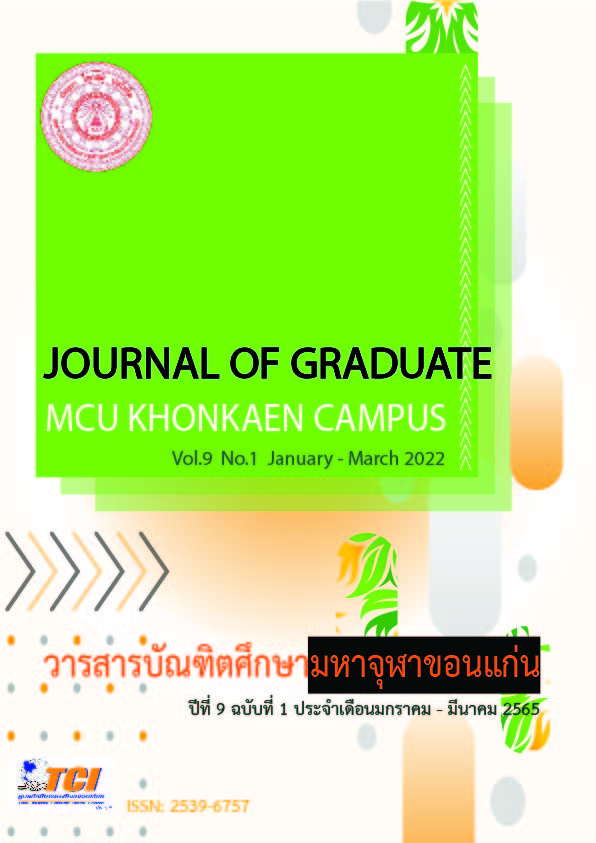An Analysis of The Buddhist Ethics in Boon Samha Tradition at Pawainang Sub-District, Banfang District, Khonkaen Province
Main Article Content
Abstract
The objectives of this research paper were 1) to study the concept of Buddhist ethics, 2) to study the Boon Sam Ha tradition of Pa Wai Nang Sub-district, Ban Fang District, Khon Kaen Province and 3) to study and analyze Buddhist ethics in the Boon Sam Ha tradition of Pa Wai Nang Sub-district, Ban Fang District, Khon Kaen Province. Is a qualitative research Study data from primary and secondary There were 30 key informants/person. The data were analyzed using the descriptive method according to the inductive method.
The research results were as follows:
1. The Buddhist ethics, It is the principle of human conduct concerning good and evil, what should be done and should not be done, is the standard of human conduct in living for goodness. There is a criterion for judging goodness based on unwholesome roots (Kusala-mũla) or roots of good actions (generosity, love, wisdom) and evil based on unwholesome roots (Akusala-mũla) or roots of bad actions ( greed, hatred, delusion).
2. Boon Sam Ha is an important tradition of Pa Wai Nang Sub-district. This is a practice that has been passed down from the past to the present. with the belief that when making merit, this will make people and the animals in the village are happy and is a merit with relatives to show gratitude to the spirits of the ancestors with the ultimate goal of Nirvana.
3. Principles of Buddhist ethics found in the Boon Samha tradition of Pa Wai Nang Subdistrict, Ban Fang District, Khon Kaen Province, namely 1) Principles of Puññakiriyà-vatthu the bases of meritorious action or grounds for accomplishing merit, 2) Principles of the Five Precepts; rules of morality and the five ennobling virtues; virtues enjoined by the five precepts 3) the quality of being a grateful person; gratitude; gratefulness. 4) bases of sympathy 4 and 5) states of conciliation ; virtues for fraternal living 6, The Buddhist ethics as mentioned above is a practice that is hidden in the ritual process that helps to create values for the quality of life of all people in Pa Wai Sit Subdistrict.
Article Details

This work is licensed under a Creative Commons Attribution-NonCommercial-NoDerivatives 4.0 International License.
References
มหาจุฬาลงกรณราชวิทยาลัย. (2539). พระไตรปิฎก (ฉบับภาษาไทย). มหาวิทยาลัยมหาจุฬาลงกรณราชวิทยาลัย. กรุงเทพมหานคร: โรงพิมพ์มหาจุฬาลงกรณราชวิทยาลัย.
กนกอร สุขุมาลพงษ์. (2551). ฟ้อนนางเทียมในพิธีบุญเลี้ยงบ้าน กรณีศึกษาบ้านกาลึม จังหวัดอุดรธานี. ใน วิทยานิพนธ์ศิลปศาสตรมหาบัณฑิต. บัณฑิตวิทยาลัย : จุฬาลงกรณ์มหาวิทยาลัย.
ชัยวัฒน์ อัตพัฒน์. (2520). จริยศาสตร์. กรุงเทพมหานคร : มหาวิทยาลัยรามคำแหง.
บุญตรี ตาแก้ว (ธนิต). (2545). ธรรมเนียมประเพณีอีสาน. กรุงเทพมหานคร: ส.ธรรมภักดี.
บุญเกิด พิมพ์วรเมธากุล. (2544). ประเพณีอีสานและเกร็ดโบราณคดีไทยอีสาน. ขอนแก่น : ห้างหุ้นส่วนจำกัดโรงพิมพ์คลังนานาวิทยา.
ปรีชา พิณทอง. (2534). ประเพณีโบราณไทยอีสาน. (พิมพ์ครั้งที่ 7). อุบลราชธานี: โรงพิมพ์ศิริธรรมออฟเซ็ท.
พวงพิกุล มัชฌิมา. (2537). บุญข้าวประดับดินและบุญข้าวสากบ้านกุดรัง ตำบลกุดรัง อำเภอบรบือ จังหวัดมหาสารคาม. วิทยานิพนธ์การศึกษามหาบัณฑิต. บัณฑิต วิทยาลัย: มหาวิทยาลัยมหาสารคาม.
พระครูสุนทรชัยวัฒน์ (ทวีสุชีโว ตัวประโคน). (2555). การศึกษาวิเคราะห์พุทธจริยศาสตร์ ในคัมภีร์อรรถกถาธรรมบท. ใน วิทยานิพนธ์พุทธศาสตรมหาบัณฑิต. บัณฑิตวิทยาลัย: มหาวิทยาลัยมหาจุฬาลงกรณราชวิทยาลัย.
พระครูปลัดสุวัฒนเมธาคุณ (ชัยยันต์ สืบกระพันธ์). (2557). บูรณาการหลักพุทธจริยศาสตร์ในการดำเนินชีวิตของคนไทยในสังคมปัจจุบัน. วารสารสถาบันวิจัยญาณสังวร, 5(1).
พระใบฎีกาสมศักดิ์ ฐิตคุโณ (อินชัน) และคณะ. (2563). การประยุกต์ใช้พุทธจริยศาสตร์เกี่ยวกับความเชื่อศาลพระภูมิเจ้าที่ของชาวพุทธในสังคมไทย. วารสารสังคมศาสตร์และมานุษยวิทยาเชิงพุทธ, 5(5).
พระครูสุนทรชัยวัฒน์ (ทวีสุชีโว -ตัวประโคน). (2555). การศึกษาวิเคราะห์พุทธจริยศาสตร์ ในคัมภีร์อรรถกถาธรรมบท. วิทยานิพนธ์พุทธศาสตรมหาบัณฑิต, บัณฑิตวิทยาลัย: มหาวิทยาลัยมหาจุฬาลงกรณราชวิทยาลัย.
พระอธิการถนอม จารุธมฺโม (ทันทะเนตร). (2558). การศึกษาประเพณีการทำบุญเบิกบ้าน ของชาวบ้านโพนสวาง ตำบลโพนงาม อำเภอโกสุมพิสัย จังหวัดมหาสารคาม. วิทยานิพนธ์พุทธศาสตรมหาบัณฑิต, บัณฑิตวิทยาลัย : มหาวิทยาลัยมหาจุฬาลง กรณราชวิทยาลัย.
พระสุขี ชาครธมฺโม (ศรีมาตย์). (2553). ศึกษาวิเคราะห์การเปลี่ยนแปลงของประเพณีฮีตสิบสอง : ศึกษากรณีตำบลเมืองเก่าอำเภอเมืองจังหวัดขอนแก่น,วิทยานิพนธ์พุทธศาสตรมหาบัณฑิต, บัณฑิตวิทยาลัย: มหาจุฬาลงกรณราชวิทยาลัย.
พระครูปริยัติวโรทัย (วงศ์จอม). (2557). ศึกษาวิเคราะห์ความเชื่อเรื่องอานิสงส์ของบุญใน สังคมไทย. วิทยานิพนธ์พุทธศาสตรมหาบัณฑิต, บัณฑิตวิทยาลัย : มหาวิทยาลัยมหาจุฬาลงกรณราชวิทยาลัย.
ศรีนวล ศุภานุสนธ์. (2546). ชีวิตที่ดีตามทรรศนะของพุทธจริยศาสตร์. ใน วิทยานิพนธ์อักษรศา สตรมหาบัณฑิต, บัณฑิตวิทยาลัย: มหาวิทยาลัยมหิดล.

